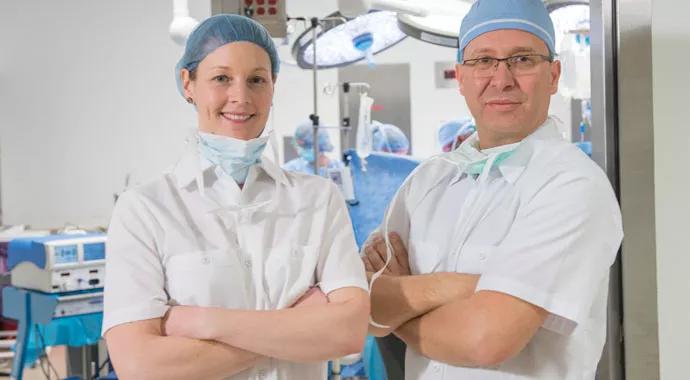Among the world’s best outcomes for most complex cases

Four of the most difficult words a patient could ever hear: “It can’t be done.”
Advertisement
Cleveland Clinic is a non-profit academic medical center. Advertising on our site helps support our mission. We do not endorse non-Cleveland Clinic products or services. Policy
Feza H. Remzi, MD, Chairman of Cleveland Clinic’s Department of Colorectal Surgery, and his Digestive Disease Institute colleagues have been working to change this reality. For more than three decades, the department has served as a destination for complicated patients with no other alternatives. As part of the largest-volume center of its type in the country, the colorectal surgery team often cares for patients who travel from nearly all 50 states for the treatment of colon or rectal cancer, inflammatory bowel disease, diverticulitis, or other serious conditions.
“Our goal is to have the clinical wisdom to approach each patient strategically, assess their situation and push the limits in finding solutions,” Dr. Remzi says. Cleveland Clinic colorectal surgeons continually collaborate on developing new ways to improve patient care.
“Our teamwork honors the department’s legacy and enables us to expand our breadth of services and lead future surgical innovation,” Dr. Remzi says. Tremendous advances are underway in surgical technology, translational research and multidisciplinary care.
Read highlights of this work, headed by the next generation of colorectal surgery leaders here:
| Help for Patients Requiring Reoperative, Complex Colorectal Surgeries Experienced team approach leads to better outcomesCleveland Clinic colorectal surgeons are among the nation’s most experienced in reoperative, complex cases. Discover how our team can help your patients. |
|---|
| Maximizing Outcomes for Pouch Disorders Patients Advances in disease classification mean better solutionsWith more than 5,000 initial and 500 reoperative pouch surgeries performed to-date, Cleveland Clinic’s Center for Ileal Pouch Disorders specializes in improving the quality of life of pouch patients from across the globe. |
| Minimally Invasive Surgery Program Continues to Push the Envelope Minor incisions, fewer complications, quicker recoveriesFrom single-port to endoscopy/laparoscopy to robotics, Cleveland Clinic’s minimally invasive surgery team brings the most advanced techniques to colorectal surgery patients. |
| Improving Rectal Cancer Care Through Collaboration OSTRiCh aims to standardize care, maximize outcomesCleveland Clinic colorectal surgeons are partnering with colleagues nationwide through the OSTRiCh consortium to help improve the care rectal cancer patients receive and to improve outcomes. |
| Research Update: Colorectal Surgery Bench research seeks answers to improve tomorrow’s careFrom intervening in colorectal-related cancer to utilizing a gold mine of outcomes data, discover how the latest bench research at Cleveland Clinic may one day improve outcomes for colorectal cancer patients. |
| On the Horizon: A New Paradigm for Battling Colorectal Cancer How care is being transformed at Cleveland ClinicFrom a brand-new, 377,000-square-foot cancer building opening in 2017 to standardizing care, discover how Cleveland Clinic is changing the way it delivers colorectal cancer care. |
| Help for Patients Requiring Reoperative, Complex Colorectal Surgeries Experienced team approach leads to better outcomesCleveland Clinic colorectal surgeons are among the nation’s most experienced in reoperative, complex cases. Discover how our team can help your patients. |
| Maximizing Outcomes for Pouch Disorders Patients Advances in disease classification mean better solutionsWith more than 5,000 initial and 500 reoperative pouch surgeries performed to-date, Cleveland Clinic’s Center for Ileal Pouch Disorders specializes in improving the quality of life of pouch patients from across the globe. |
| Minimally Invasive Surgery Program Continues to Push the Envelope Minor incisions, fewer complications, quicker recoveriesFrom single-port to endoscopy/laparoscopy to robotics, Cleveland Clinic’s minimally invasive surgery team brings the most advanced techniques to colorectal surgery patients. |
| Improving Rectal Cancer Care Through Collaboration OSTRiCh aims to standardize care, maximize outcomesCleveland Clinic colorectal surgeons are partnering with colleagues nationwide through the OSTRiCh consortium to help improve the care rectal cancer patients receive and to improve outcomes. |
| Research Update: Colorectal Surgery Bench research seeks answers to improve tomorrow’s careFrom intervening in colorectal-related cancer to utilizing a gold mine of outcomes data, discover how the latest bench research at Cleveland Clinic may one day improve outcomes for colorectal cancer patients. |
| On the Horizon: A New Paradigm for Battling Colorectal Cancer How care is being transformed at Cleveland ClinicFrom a brand-new, 377,000-square-foot cancer building opening in 2017 to standardizing care, discover how Cleveland Clinic is changing the way it delivers colorectal cancer care. |
These articles are just a snapshot of the clinical innovation and research taking place in Cleveland Clinic’s Department of Colorectal Surgery. Ultimately, the Cleveland Clinic credo of “Patients First” is what fuels the program’s work. The goal is for today’s research and innovation to become tomorrow’s patient care.
Advertisement
“When we push the limits to find solutions for patients who have been told ‘It can’t be done,’ we are doing so on the patients’ behalf,” Dr. Remzi says. “And what we have found is that more often than not, it can be done.”
To refer a patient to the Department of Colorectal Surgery, call 855.REFER.123.
Advertisement
Advertisement

First-of-its-kind research investigates the viability of standard screening to reduce the burden of late-stage cancer diagnoses

Global R&D efforts expanding first-line and relapse therapy options for patients

Study demonstrates ability to reduce patients’ reliance on phlebotomies to stabilize hematocrit levels

A case study on the value of access to novel therapies through clinical trials

Findings highlight an association between obesity and an increased incidence of moderate-severe disease

Cleveland Clinic Cancer Institute takes multi-faceted approach to increasing clinical trial access 23456

Key learnings from DESTINY trials

Overall survival in patients treated since 2008 is nearly 20% higher than in earlier patients